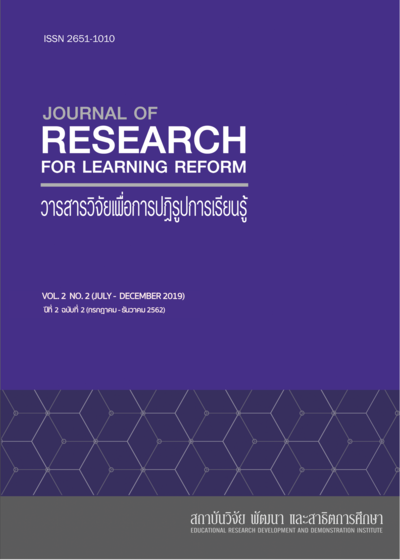การพัฒนาคุณธรรมนักเรียนในการจัดการเรียนรู้ด้วยวิธี Moral STEP
Abstract
บทคัดย่อ การวิจัยในครั้งนี้ มีวัตถุประสงค์เพื่อพัฒนารูปแบบการจัดการเรียนรู้ที่ส่งเสริมคุณธรรมของนักเรียนของโรงเรียนบ้านนิคมสร้างตนเองธารโต ดำเนินการวิจัยตามขั้นตอนดังนี้ ขั้นตอนที่ 1 ขั้นการวางแผน เป็นการสร้างทีมงาน วิเคราะห์ สภาพปัญหาและความต้องการในการพัฒนาคุณธรรม และกำหนดคุณธรรมอัตลักษณ์ของโรงเรียน ขั้นตอนที่ 2 ขั้นการวิเคราะห์ข้อมูล เป็นขั้นตอนการศึกษาสภาพการจัดการเรียนรู้และแนวทางการพัฒนาคุณธรรมในสถานศึกษา ขั้นตอนที่ 3 ขั้นบูรณาการ เป็นขั้นของการทำงานแบบบูรณาการเพื่อกำหนดรูปแบบการจัดการเรียนรู้และจัดทำแผนการจัดการเรียนรู้ตามรูปแบบ และขั้นตอนที่ 4 ขั้นการปฏิบัติ เป็นการดำเนินการตามแผนการจัดการเรียนรู้และประเมินผล ผลการวิจัยพบว่า ทีมงานโครงการคุณธรรมโรงเรียนบ้านนิคมสร้างตนเองธารโต ประกอบด้วย 3 ฝ่าย คือ ตัวแทนครู ตัวแทนชุมชน ตัวแทนผู้ปกครองจำนวน 9: 3: 3 คน มีการกำหนดคุณธรรมอัตลักษณ์ของโรงเรียนไว้ 4 ประการคือ 1) มีมารยาท 2) มีระเบียบวินัย 3) มีน้ำใจ และ 4) มีความพอเพียงรูปแบบการจัดการเรียนรู้ที่ส่งเสริมคุณธรรม ซึ่งกำหนดเป็นขั้นตอนคุณธรรม (Moral STEP) ดังนี้ ขั้นที่ 1 S (Separate) การแยกแยะสิ่งที่ดีและไม่ดี ขั้นที่ 2 T (Teach) สอน ปลูกฝังคุณธรรม ขั้นที่ 3 E (Elaborate) ขยายคุณธรรม ขั้นที่ 4 P (Perceptive) การเข้าใจแจ่มแจ้งจนเกิดนิสัย การสังเกตพฤติกรรม 4 ด้านของนักเรียน คือ 1) ทำตามข้อตกลง 2) มีน้ำใจ 3) ตรงต่อเวลา 4) พอเพียง ในทุกด้านนักเรียนแสดงพฤติกรรมมีความถี่เพิ่มขึ้น ร้อยละ 84.38 ของนักเรียนที่เข้าร่วมกิจกรรม และจากการสะท้อนผลหลังกิจกรรมการจัดการเรียนรู้กิจกรรมคุณธรรมสร้างสรรค์ โครงงานคุณธรรม มีผลให้นักเรียนเปลี่ยนแปลงพฤติกรรมมากขึ้นคำสำคัญ: การพัฒนา รูปแบบการจัดการเรียนรู้ การส่งเสริมคุณธรรม Abstract The main objective of this research was to develop a learning model of student morality for Bannikom Sangtoneng Thanto school. The research procedure was divided into 4 phases: Phase 1) Planning; form a team to analyze problems and needs, and to identify the moral of the school. Phase 2) Analysis; the process of studying the condition of learning management and the guidelines for moral development in the school. Phase 3) Integration; an integrated work process to determine the style of learning management and create a learning management plan according to the model. Phase 4) Action; the implementation of the learning management and evaluation plan. The research findings were as follows. The moral project team of Bannikom Sangtoneng Thanto school consists of 9: 3: 3 representatives; teachers, community, and parents respectively. There are 4 moral characteristics determined for the school which are 1) good manners; 2) discipline; 3) consideration; and 4) sufficiency. The learning model of student morality which is defined as the MORAL STEP is as follows. Step 1) Separation; distinguishing between good and bad things. Step 2) Teaching; teaching moral cultivation. Step 3) Elaboration; expanding morality. Step 4) Perception; understanding until they become habit. The students were observed in 4 behavioral dimensions including 1) following the rules; 2) being considerate; 3) being punctual; and 4) being sufficient. The students demonstrated these behaviors with increased frequency at 84.38 % after learning the model. It was found that the moral projects could change the students’ behavior. Keywords: Development, Learning model, MoralityDownloads
Downloads
Published
Issue
Section
License
1) ต้องรับรองว่าผลงานที่ส่งมานั้นเป็นผลงานใหม่และไม่เคยตีพิมพ์ที่ใดมาก่อน
2) เนื้อหาของบทความจะต้องเป็นไปตามวัตถุประสงค์ของวารสาร และบทความต้องไม่คัดลอกผลงานของบุคคลอื่น
3) ต้องรายงานข้อเท็จจริงที่เกิดขึ้นจากการทำวิจัย ไม่บิดเบือนข้อมูลหรือให้ข้อมูลที่เป็นเท็จ
4) ต้องเขียนบทความให้ถูกต้องตามรูปแบบที่กำหนดไว้ใน “คำแนะนำสำหรับผู้เขียน”
5) ต้องปรับบทความตามรูปแบบและขนาดตัวอักษรตามแบบฟอร์ม (template) ของวารสาร
6) ผู้เขียนที่มีชื่อปรากฏในบทความทุกคนต้องเป็นผู้ที่มีส่วนในการดำเนินการวิจัยจริง
7) ต้องอ้างอิงผลงานของผู้อื่น กรณีที่มีการนำผลงานเหล่านั้นมาใช้ในผลงานของตัวเอง รวมทั้งจัดทำรายการอ้างอิงท้ายบทความ
8) ต้องตรวจสอบความถูกต้องของรายการเอกสารอ้างอิงทั้งในแง่ของรูปแบบและเนื้อหา บทความจะต้องไม่เคยตีพิมพ์เผยแพร่ที่ใดมาก่อน และไม่อยู่ระหว่างการพิจารณาของวารสารฉบับอื่น หากตรวจสอบพบว่ามีการตีพิมพ์ซ้ำซ้อน ถือเป็นความรับผิดชอบของผู้เขียนแต่เพียงผู้เดียว โดยผู้เขียนจะต้องรับผิดชอบค่าใช้จ่ายในการพิจารณาบทความดังกล่าว
9) ไม่ควรนำเอกสารวิชาการที่ไม่ได้อ่านมาอ้างอิงหรือใส่ไว้ในเอกสารอ้างอิง ควรอ้างอิงเอกสารเท่าที่จำเป็นอย่างเหมาะสม ไม่ควรอ้างอิงเอกสารที่มากจนเกินไป
10) ต้องระบุแหล่งทุนที่สนับสนุนในการทำวิจัยนี้และ / หรือมีผลประโยชน์ทับซ้อน (หากมี) จะต้องระบุในบทความและแจ้งให้บรรณาธิการทราบ





